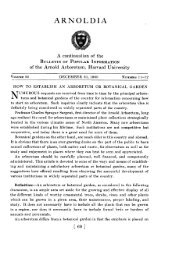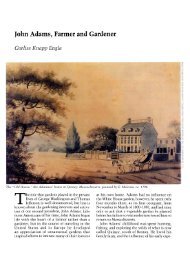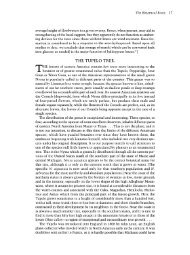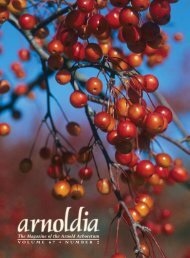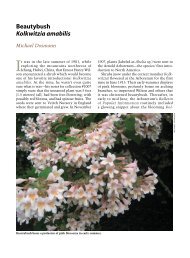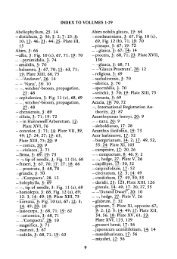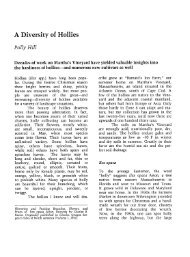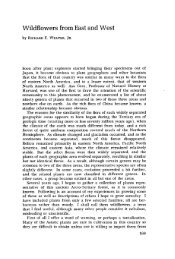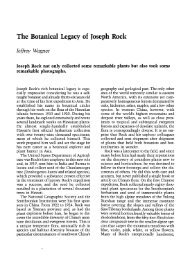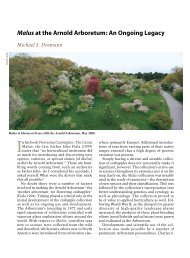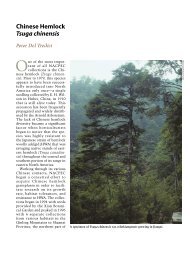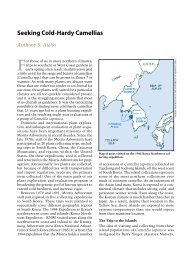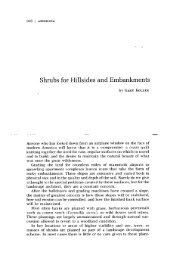Open as a single document - Arnoldia - Harvard University
Open as a single document - Arnoldia - Harvard University
Open as a single document - Arnoldia - Harvard University
Create successful ePaper yourself
Turn your PDF publications into a flip-book with our unique Google optimized e-Paper software.
68<br />
all cone-bearing trees which can be grown in this part of the country.<br />
One plant of the Japanese Tsuga densiflora w<strong>as</strong> killed during the<br />
winter, but several others were uninjured. Small plants of the Japanese<br />
T. Sieboldiana have lived in an exceptionally sheltered position,<br />
but there is little hope that this beautiful tree, which is more southern<br />
in its range than the other Japanese Hemlock will ever live long in<br />
M<strong>as</strong>sachusetts. A small plant of the Hemlock of the Northwest co<strong>as</strong>t<br />
of North America (T. hetsrophylla), the largest and handsomest of all<br />
Hemlock trees, w<strong>as</strong> uninjured in a sheltered position. There is not<br />
much probability, however, that this tree will live for more than a<br />
few years in this part of the country. The Chinese Hemlock (T. chinensis)<br />
w<strong>as</strong> injured by the winter and probably will never be very successful<br />
here.<br />
Pines. The European and Asiatic Pinus sylvestris, the so-called<br />
Scotch Pine, tne Austrian and other forms of the European Black Pine<br />
(P. nigra), the forms of tne European P. montana, and the Swiss and<br />
Siberian forms of the Stone Pine (P. Cembra) have not been injured.<br />
The Japanese White Pine (P. parviflora), the Japanese Red Pine (P.<br />
densiflora and the Korean form of this tree which the Japanese botanists<br />
call Pinus gradhs, seem able to support the New England climate<br />
without injury. The Korean Nut Pine (P. koraiensis) which h<strong>as</strong> produced<br />
seeds in the Arboretum for several years, and the Lacebark Pine of<br />
northern China (P. Bungeana) are uninjured. Of the Pines of western<br />
North America only Pinus monticola, P. ponderosa var. scopulorum,<br />
and P. Jeffreyi grow successfully in the e<strong>as</strong>t, and these are uninjured,<br />
<strong>as</strong> are the e<strong>as</strong>tern American P. pungens and P. virginiana. The<br />
northern Pinus Banksiana, which just reaches northern New England,<br />
with a doubtful station on Nantucket, grows well in the Arboretum<br />
but not <strong>as</strong> well <strong>as</strong> it grows much further north. Although killed l<strong>as</strong>t<br />
winter in some New England collections, the Japanese Umbrella Pine<br />
w<strong>as</strong> little injured in the Arboretum.<br />
None of the Arbor Vitae in the large collection of these trees here<br />
suffered with the exception of the Chinese Thuya orientalis which is<br />
never a very hardy or satisfactory tree in this part of the country.<br />
It is of particular interest that plants of the western Arbor Vitae, the<br />
so-called Red Cedar of the northwest (T. plicata), raised here from<br />
seeds gathered in Idaho, have been uninjured, for this is one of the<br />
great conifers of the world. In a sheltered position several plants of<br />
the California Incense Cedar were little injured by the winter. There<br />
h<strong>as</strong> been little injury to the Junipers, and the Larches and the Chinese<br />
Pseudolarix have not suffered.<br />
New Chinese Conifers. It is too soon to say much about the new<br />
conifers introduced by Wilson from northern China. All the forms of<br />
Pinus sinensis are growing well and appear to be hardy. All the<br />
Spruces have also done well with the exception of Picea Sargentiana<br />
which h<strong>as</strong> suffered from cold and will probably not be hardy here.<br />
The Chinese Firs grow less well than the Spruces and only Abies<br />
Delavayi gives much promise of success.



